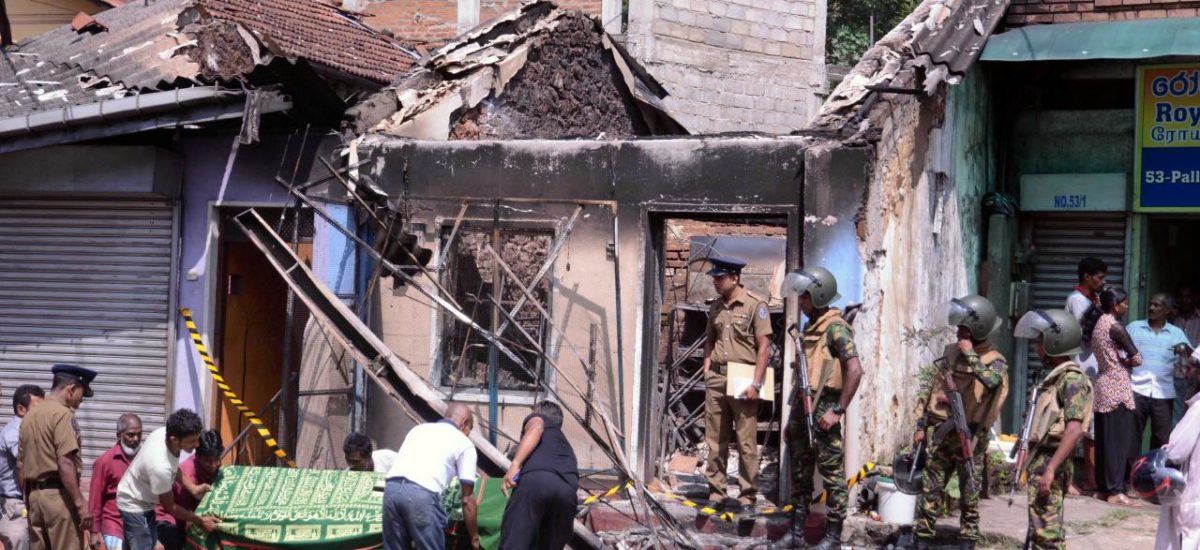Featured image courtesy Reuters
We write to condemn ongoing violence against Sri Lanka’s Muslim community, especially the brutal attacks perpetrated over the past week. We are outraged that the government has failed to act speedily and decisively to stop the violence and bring those responsible to justice. The government must act firmly to prevent more destruction and bloodshed.
The scale and nature of recent attacks on the Muslim community are the result of years of successive regimes in Sri Lanka pandering to chauvinist nationalists. Targeted and organized attacks against Muslim communities in Ampara, Teldeniya, and Kandy are not isolated incidents, but must be seen within a longer history of attacks on Muslims in Sri Lanka, including wartime violence by the Liberation Tigers of Tamil Eelam (LTTE) against northern and eastern Muslims. After the end of the war, majoritarian attacks against Muslims living in the East and South have escalated. In May 2014, Sinhala Buddhist nationalists attacked and burned the Muslim-owned store, Fashion Bug, and its head offices in Colombo. In June 2014, Sinhala Buddhist nationalists again carried out anti-Muslim riots in Aluthgama, Beruwala and other areas in the Kalutara District. In 2017 alone, there were 20 documented incidents of violence against Muslims, including the September 2017 attack on a UNHRC shelter housing 31 Muslim Rohingya refugees in Colombo. Sinhala Buddhist monks led this last attack in direct violation of international human rights treaties on the protection of refugees, which Sri Lanka has ratified. In some of these instances, members of the police and security forces were present, but did nothing to halt the perpetrators or protect the victims. While some civil society organizations in Sri Lanka have condemned these orchestrated acts of violence, the government has failed to hold the responsible political and religious figures to account. Bodu Bala Sena (BBS), for example, openly propagates hate speech against Muslims, and promotes xenophobia, racism, and bigotry. Such actors do not operate in a vacuum; the ‘inaction’ of political authorities and the police against them is in fact an active intervention, encouraging groups like the BBS and Maha Sona Balakaya to act with impunity.
We, members of the Sri Lankan diaspora and Sri Lankans living abroad, from all of the country’s diverse communities, stand in solidarity with our Muslim sisters and brothers. We believe that declaring a state of emergency and curbing free media and social networks are not sustainable solutions to issues of equal rights and the protection of minorities. In the long run, such measures will only expand the repressive powers of the state. The government must take swift action to bring those responsible for anti-Muslim violence to justice. We call on the government to hold accountable law enforcement and political authorities who have reneged on their responsibility to protect all members of the Sri Lankan community. We also call on the government to move on long-term questions of constitutional reform that can lay the foundation for a future of peace with justice and security for all its citizens, including minorities.
- Vasuki Nesiah, New York University
- Nimanthi Perera-Rajasingham, Colgate University
- Mythri Jegathesan, Santa Clara University
- Kanishka Goonewardena, University of Toronto
- V.V. Ganeshananthan, University of Minnesota
- Qadri Ismail, University of Minnesota
- Sharika Thiranagama, Stanford University
- Sonali Perera, City University of New York
- Kitana Ananda, City University of New York
- Sanjeevi Nuhumal, Haverford College
- Kathleen Fernando, Kenyon College
- Kanchana Ruwanpura, University of Edinburgh
- Pradeep Sangapala, University of Alberta
- Arjun Guneratne, Macalester College
- Amarnath Amarasingam, University of Waterloo
- Arjini Nawal, Harvard University
- Neil DeVotta, Wake Forest University
- Nihal Perera, Ball State University
- Sandya Hewamanne, University of Essex
- Nira Wickramasinghe, Leiden University
- Nalin Jayasena, Miami University
- Prashanth Kuganathan, Columbia University
- Shiyana Gunasekara, Johns Hopkins University
- Sukanya Emmanuel, Cornell University
- E Valentine Daniel, Columbia University
- Varuni Wimalasiri, Bournemouth University
- Dinidu Karunanayake, Miami University
- Vidyamali Samarasinghe, American University
- Mahesan Niranjan, University of Southampton
- Nethra Samarawickrema, Stanford University
- Dilshanie Perera, Stanford University
- Myra Sivaloganathan, McMaster University
- Namika Raby, California State University
- Geethika Dharmasinghe, Cornell University
- Sudesh Mantillake, University of Maryland & University of Peradeniya
- Eshantha Peiris, University of British Columbia
- Devaka Gunawardena, University of California, Los Angeles
- Themal Ellawala, Clark University
- Shobhana Xavier, Ithaca College
- Nalika Gajaweera, University of Southern California
- Ashwini Vasanthakumar, King’s College London
- Yalini Dream, University of San Francisco
- Mihirini Sirisena, University of Edinburgh
- A.R.M. Imtiyaz, Temple University
- Deborah Philip, City University of New York
- Tony Anghie, University of Utah
- Tanuja Thurairajah, University of Zurich
- Sammani Perera, Miami University
- Achinthya Bandara, Texas Tech University
- Kasun Gajasinghe, Montclair State University
- Upul Wickramasinghe, University of Durham
- Thushara Hewage, University of Ottawa
- Tariq Jazeel, University College London
- Kanya D’Almeida, Columbia University

